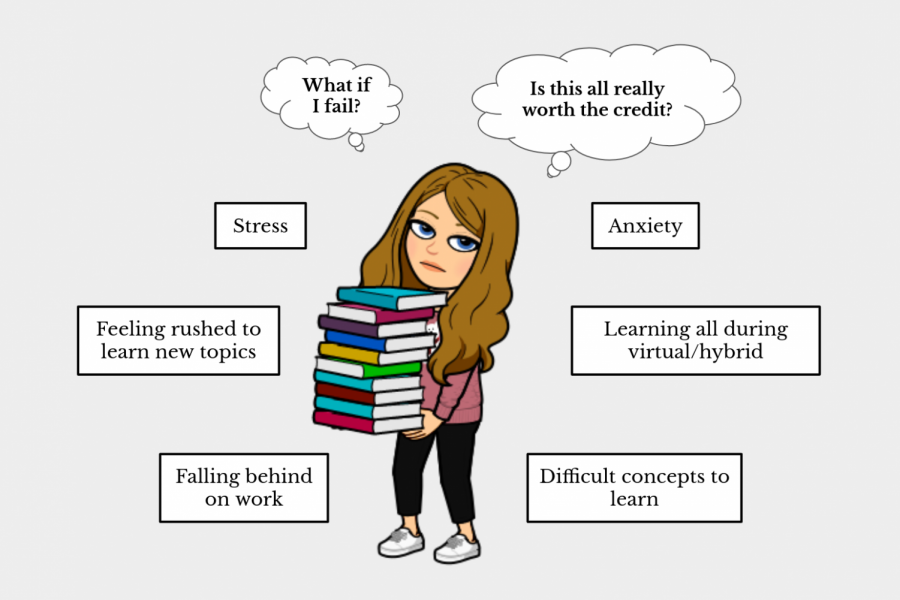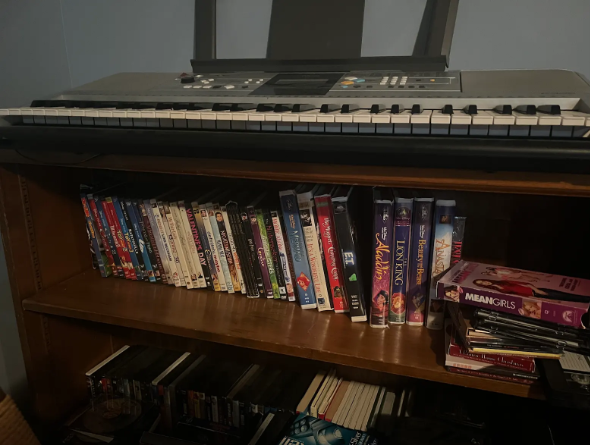AP courses + pandemic virtual school = Advanced learning still preferred approach
Showing the doom and gloom of AP classes and what all students feel at times.
What does the buildup of AP courses plus the stress of a pandemic do to a teen? For many, they are stuck learning advanced, confusing subjects with little help at home and are still expected to take full length AP exams at the end of the school year.
The April Angst: Was this the right decision for me?
Looking back on course registrations, many current juniors and seniors signed up for AP classes prior to knowing they would be learning in an all virtual pandemic. Juniors signed up for AP classes in February of their sophomore year, a month before the disaster, never guessing that a year later they would be trying to teach themselves the fundamentals of AP Calculus or Biology.
Would that knowledge have changed their choices? Maybe and maybe not. Hindsight is 20/20. The optimism of taking on a challenge has changed to the crushing reality that it’s hard. Very hard.
“If I had known about the pandemic when signing up for AP course, it would have put me off, but going through the course online is not as bad as it may seem and is very manageable once you get the hang of it – I’ve always been a science person, and taking AP Biology this year, even virtually, has helped me grow and learn so many new things,” said Junior Emma Jaffe.
Most students have grown comfortable with taking AP courses online and feel that it would still be similar to an all in-person class. Similarly, coursework for AP classes is already assigned through AP Classroom and done virtually.
“The pandemic doesn’t change my option on taking AP courses and signing up for them because most AP class work is already online, so it doesn’t change too much. I enjoy my AP courses and what we are learning. I also like how in depth teachers go. Compared to just the honors level classes, we cover so much more, ” said junior Mady Hull.
And what about students who took AP in the fall–when classes met even less frequently? Yikes.
“I’ve shortened the information significantly this year,especially. Last year we had an entire year to teach AP Modern World. The county shortened it to a semester class starting in the 2020-2021 school year prior to the pandemic. The semester class already rushed the information for the students, adding the pandemic onto it with limited class time just rushed the information even more for students,” said AP World History teacher Mrs.Richardson.
Some students are struggling to keep up with the course materials. Most would prefer the full-length, 80-minute class periods to ask questions and receive in-depth answers. Instead, students get a 50-minute class period four days a week with rushed lectures and barely enough time to cover a single topic.
The biggest difference, of course, is that students need so much more self-discipline. Even 80 minutes of a virtual class would not compare to the learning in front of the instructor. Students have an hour each day to attend office hours to get help. Do they use that time to their advantage?
“Virtual and in person instruction ending at 12:30 gives both AP and honors students a lot more independence and responsibility to manage their time and complete assignments. It is really up to the student how they want to spend their time. Personally I think it is a great time to work and study and something that should be used more often,” said junior Maeve Smarick.
The added bonus for virtual AP students
One bonus is the open-note class tests and new-found leisure time that comes with taking an exam from the quiet and comfort of your bedroom, at home desk, or kitchen table. Students have the ability to glance at their notes when struggling to piece together a difficult calculus problem or history lesson.
“I can’t compare how students score on reading and vocabulary quizzes because I changed the format of these, removing the reading quizzes with virtual school and converting them into class-wide or group activities, and making the vocabulary and grammar homework assignments rather than a tested quiz. In other classes, I have seen an upward trend on vocabulary and reading quizzes, which I assume is due to students treating each quiz as open book (even though that’s not the format of the quiz) versus what it was in the physical classroom with no notes used,” said AP Literature teacher Mrs. Mary Troxel.
At school, students sit in the classroom with test-day nerves. They might be worried about the pencil or calculator they will use, or where to sit, and worst of all, how they might do on the exam. In school there is the stress of a time limit and the testing atmosphere that makes taking the test so difficult. However at home, AP and honors students alike do not have to experience this. Yes, there is still the surrounding stress of knowing the information and getting a good grade, but there really isn’t any testing atmosphere anxiety.
“I feel much more confident in taking my AP tests at home. Especially because when you are home it’s quiet; there are few distractions; and there really aren’t any time constraints. The time constraints, especially, are the hardest part for me when it comes to testing in person,” said Jaffe.
Some AP students even feel that the quality of their assignments and how quickly they can work ahead in their classes has changed with online learning.
“I feel like I’ve been doing better in my AP courses this year because the majority of the resources are online and I can work at my own pace without needing to rely on the teacher or other students. I’ve never been a very good test taker but this year I haven’t been as stressed when it comes to tests because we are at home,” said junior Mady Hull.
The College Board has also started making videos covering each individual topic for the AP course, and reviewing how you should answer the questions on the AP test. This is a way for students to go back after class and review a difficult lesson with in-depth answers.
This is another added bonus for AP students because it allows them to go back and review topics they might be struggling with, these videos can be rolled over to next year’s AP students
How would you like that AP test delivered?
The biggest difference for students when registering for the exams is getting the option of how they want to take the test. All AP students were given the option to take the test several different ways, all with the same materials. Students even have the option to opt out and take an at-home AP exam at the same time students take it in the building.
Students were allowed to vote on what format they wanted to take the test on. There were several choices but it all came down to a paper exam and a digital one. It was based on a majority vote: if the majority of students wanted a paper exam, then all students would take a paper exam, regardless of their vote.
It is a class by class decision, and one example of this is Mrs. Ericsson’s AP biology class. The class voted for the digital exam.
Junior Olivia Fullarton is disappointed. She prefers her AP exam delivered on paper rather than digitally, “Personally, I prefer the paper exam because I can actually have the papers in front of me, draw out diagrams, take notes on the questions, or underline important information,” said Fullarton.
“I prefer paper and being in-person for learning AP courses and taking the tests just because it limits the amount of distractions from learning virtually,” said junior Mady Hull.
Other students and teachers feel that the digital exam is more flexible and gives the students who are staying virtual all year long the opportunity to take the exam just like everyone else. There is an underlying comfort and safety in taking the digital exam because that is how AP students have been tested all year long.
“I prefer taking the exam digitally. I think in part because I’m so used to it, but also because it’s so much easier to write down messy thoughts and then construct them into a clear answer, instead of having to erase and rewrite,” said junior Emma Jaffe.
“This virtual familiarity of students will hopefully assist with taking the AP exam virtually as students will be used to typing and editing their writing and multiple choice online, just like they’ll have to type their essays and answer their multiple choice questions online,” said Troxel.
The New Timeline for AP students
This decision also affected the amount of time students have to finish learning the material for the test, there is a one-week time difference between the two options, on paper being May 14 and digitally being May 27. While this seems like such a waste of time to wait an extra week to take a test, this week gives AP students and teachers extra time to prepare and review before taking the test.
Both of these options give students 1-2 weeks more to prepare for the exam, which is longer than previous years exams and is considered an advantage this year.
“For AP World it has definitely been a benefit to the students. Spring semester courses are always difficult because the testing is so much earlier than the end of term, but this allows for 10 more teaching days which allows us to cover more content and have more practice at the skills portion of the test. Another advantage to second semester students is that the second test comes with one less essay, which means there is less skills to cover, once again allowing for more time to cover the others such as the DBQ and SAQs,” said Richardson.
AP teachers have also been making sure they are working and talking with their students during this crazy year to make sure there isn’t too much work to complete in one night, or revisiting a difficult topic if needed. AP teachers have also spent more time organizing their work and making it clear for students what the expectations are in the classroom.
“My AP teachers have been great this year. All of them have different ways of teaching, but all are great. Mrs. Richardson is very organized and makes outstanding weekly agendas. The agenda has so many extra resources along with the assignments and lecture notes. Mr. Beaver used Kami to have us practice drawing all the graphs in class. It was a great way to keep us engaged in an online setting. Mrs. Ericsson is mixing up what we do all the time, from fun virtual labs to notes. She keeps us on our toes while preparing the class for the AP test,” said Smarick.
Was it really worth it?
While the “was it worth it?” The question will never be fully answered, it is evident that AP classes, even while in a pandemic, help students grow their understanding of difficult concepts while being able to ask questions and get feedback daily from teachers.
AP classes do not compare to most honors or Frederick Community College (FCC) courses in the amount of resources and content covered.
“I think AP Biology is still beneficial for the students currently taking the course virtually. We are able to spend time on each topic, exploring the topics in depth, even though we’re not doing the same type of hands-on labs. AP Bio allows for that deeper exploration, leading to a greater understanding and hopefully then remembering the information as students move on in sciences after high school,” said Ericsson.
Biology teacher Mrs. Ericsson has experience in all 3 courses (Honors, FCC, and AP) and agrees that AP Biology covers the most content and allows for many in depth discussions since it is full year.
While students continue to near the AP test, many reflect on the AP courses they have taken and try to look at how they have grown as a student, improved their study habits, and learned new things. There are new pros to the test and the course working for the students this year, such as the timeline, more office hours to ask questions, and the College Boards support through videos will likely remain for future students.
The progress that you have made throughout your AP course should not be reflected on your one final AP test score, but how you personally have grown as a student and learned new things. AP classes are all about expanding your knowledge on difficult subjects and having teachers there to answer difficult questions. Even in a pandemic, the rewards outweigh the frustration.
Your donation will support the student journalists of Linganore High School. Your contribution will allow us to purchase camera/recording equipment and software. We hope to raise enough money to re-start a monthly printed issue of our paper.











Nic • May 23, 2021 at 12:43 am
Awesome article!!